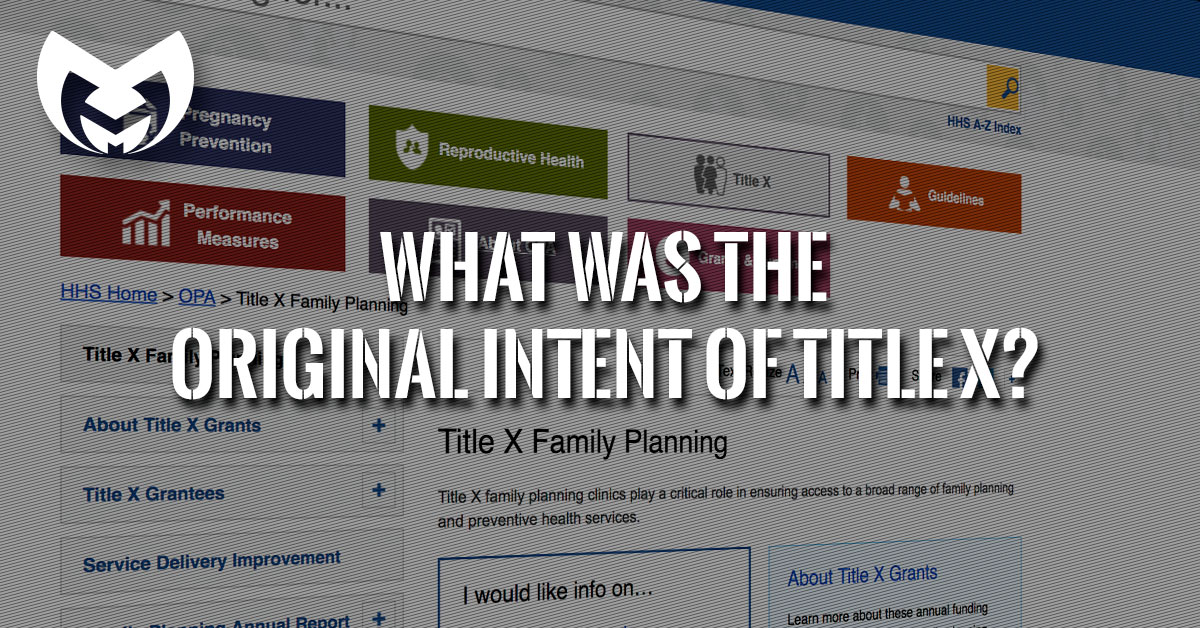SG Jones | March 2, 2019
If you are paying attention at all to the current back-and-forth over abortion, you’ve probably noticed a discussion about the Department of Health and Human Services’ (HHS) rules on federal funding and their impact on abortion providers, especially Planned Parenthood.
An HHS rule is undergoing revision that regulates the use of funds in a federal grant program known as “The Title X Family Planning program” or “Title X.” This program was enacted in 1970 and is unique in purpose. It is the only federal program dedicated solely to providing “comprehensive family planning and related preventive health services.” By law, the program gives priority to low-income families.
Title X serves about 4 million people every year and is currently funded at over $286 million. Health care clinics that meet regulatory standards can receive Title X funding, but this latest rule revision would require abortion providers like Planned Parenthood to fundamentally change how they operate in order to continue to receive these federal funds.
The reaction to the revision has been strong, but some of the terms being bandied about in response are a bit unclear. Take for example a phrase being used by some in response to HHS’s final rule.
For abortion advocates, talk of a domestic “gag rule” has raised alarms that the current administration is coordinating an assault on access to both health care and critical health information for low-income women and families. House Speaker Nancy Pelosi, Planned Parenthood, and MSNBC (among others) have used this term to describe the rule revision.
But what does the term mean exactly? The answer might not be entirely clear to the casual observer.
For example, Pelosi’s statement on the HHS rule boils it down to having the “effect of denying access to health care and family planning services to many vulnerable families.”
It goes on:
“The Trump Administration’s Gag Rule strikes a staggering blow to women’s basic health rights. This outrageous assault on the health care of vulnerable and underserved women and families would choke off their access to affordable contraception, critical health information and preventive health care, gravely undermining the health and strength of America.”
But how exactly is the rule an “assault?” In what ways have access to care and information been “choked off?” Who is being “gagged?” The statement does not say.
Planned Parenthood’s own statement on the rule is a bit more clear:
“Despite mass outcry from the medical community and American people, the Trump-Pence administration today released a final gag rule that undermines Title X, the nation’s program for affordable birth control and reproductive health care, and makes it illegal for health care providers in the program to refer patients for an abortion. This puts health care at risk for 4 million patients and keeps women from having information about all of their health care options.”
Now we come to it.
Setting aside the debatable claim of a mass outcry, we can see more clearly what is intended by the term “gag rule.” Unsurprisingly, the claims to restrictions regarding “reproductive health care” and “critical health care information” are about prohibitions on health care providers referring for abortion.
For those entirely unfamiliar with the term “gag rule,” it hearkens back to 1984 and a similar Reagan-era regulation on Title X regarding prohibitions on abortion counseling or referrals. The term has also been used to describe the well-known “Mexico City Policy” (as an “international gag rule”). The Mexico City Policy was a Reagan administration expansion on the “Foreign Assistance Act” of 1961. The Foreign Assistance Act originally prohibited non-governmental organizations that received federal funds from the United States from using those funds “to pay for the performance of abortions as a method of family planning, or to motivate or coerce any person to practice abortions.” The Mexico City Policy—which was reinstated by the Trump administration in 2017—expanded the Foreign Assistance Act prohibitions to cover a wider range of activities, including “providing advice, counseling, or information regarding abortion, or lobbying a foreign government to legalize or make abortion available.”
With that in mind, can we call the HHS rule on Title X a “gag rule?” Well, yes and no.
The current rule revision in no way reinstates the abortion counseling prohibition for health care providers who receive Title X funding (as the Reagan rule did, both domestically and internationally). In fact, HHS explicitly states that the rule “permits, but no longer requires, nondirective pregnancy counseling, including nondirective counseling on abortion.” The rule does however remove the previously established “requirement for abortion referral, replacing it with a prohibition on referral for abortion as a method of family planning.”
This change is significant in that it brings regulations governing Title X funds back in line with the original intent of the program, which prohibits “the use of Title X funds to perform, promote, refer for, or support abortion as a method of family planning.” A more well-known provision in the rule also does this, requiring “clear financial and physical separation between Title X and non-Title X activities, reducing any confusion on the part of Title X clinics and the public about permissible Title X activities between the two.”
Non-Title X activities of course include performing or referring for abortion, which is why the rule revision will have such a profound effect on how Planned Parenthood operates if it does not comply. The abortion provider stands to lose an estimated $60 million of federal funding per year.
So there you have it. The HHS final rule on Title X is a “gag rule” only in so far as it brings the use of funds back into line with the original intent of the program.
And that is a good thing.



Leave A Comment